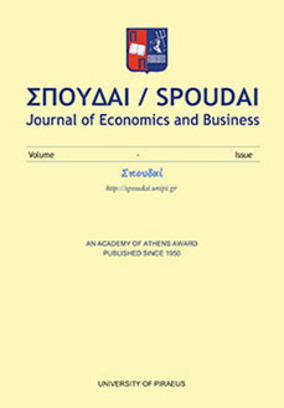Currency union and foreign direct investment inflow : evidence from economic community of West African states (ECOWAS)
Part of : Σπουδαί : journal of economics and business ; Vol.63, No.1-2, 2013, pages 121-132
Issue:
Pages:
121-132
Author:
Abstract:
This study investigates the effect of currency union membership on foreign direct investment inflow to ECOWAS subregion. The study employed panel dynamic ordinary least square (DOLS) to estimate a panel data of fifteen ECOWAS countries from 1995 to 2010 with the framework of the gravity model. The result indicates a positive effect of a currency union on FDI inflow to ECOWAS, which shows that the presence of a currency union is likely to increase FDI by 46%. The control variables; political constraint, current account and trade openness is significant in explaining FDI inflow to ECOWAS. The implications of the findings are that currency union positively influences the flow of FDI into ECOWAS region, and this requires stable political environment, financial and trade openness. It goes to suggest that adoption of common currency should go with these factors to maximize the benefit of currency union membership in the region.
Subject (LC):
Keywords:
currency union, foreign direct investment, gravity model and DOLS
Notes:
Περιέχει πίνακες και βιβλιογραφία
References (1):
- Anderson, J. and van Wincoop, E., 2003. Gravity with Gravitas: A Solution to the Border Puzzle,American Economic Review, 93, pp. 170-192.Anderson, J. E., 1979. A theoretical foundation for the gravity equation, American Economic Review69, pp. 106-116.Anderson, J. E. and van Wincoop, E., 2004. Trade Costs. Journal of Economic Literature 423, 691-751.Aristotelous, K. and Fountas, S., 2012. What is the impact of currency unions on FDI flows? Evidencefrom eurozone countries, South-Eastern Europe Journal of Economics. 2, 87-98.Bankole A. S., 2008. Rules Of Origin in EU-West Africa Economic Partnership Agreement EPA,Ibadan Journal of Social Sciences, Vol. 6, No. 2, pp. 135-153.Bergstrand, J. H., 1985. The Gravity Equation in International Trade: Some Microeconomic Foundationsand Empirical Evidence, Review of Economics and Statistics, Vol. 67, No. 474-481.Bergstrand, J. H., 1989. The Generalized Gravity Equation, Monopolistic Competition, and theFactor-Proportions Theory in International Trade, Review of Economics and Statistics, Vol.71, No. 1, pp. 143-153.Brouwer, J., Paap, R. and Viaene, J. M. A., 2008. The trade and FDI effects of EMU enlargement.Journal of International Money and Finance, 272, 188-208.Busse, M., Ko..niger, J. and Nunnenkamp, P., 2008. FDI Promotion through Bilateral InvestmentTreaties: More Than a Bit?, Kiel Working Papers 1403.De Sousa, J. and Lochard, J., 2006. Does the Single Currency affect FDI? A Gravity-like Approach,Working Paper, University of Paris and University of Rennes.De Sousa, J. and Lochard, J., 2011. “Does the Single Currency Affect Foreign Direct Investment?”Scandinavian Journal of Economics 1133: 553-578.Deardorff, Alan V., 1998. “Fragmentation in Simple Trade Models”, Discussion Paper No. 422, ResearchSeminar in International Economics, University of Michigan, January 7.Henisz, W., 2000. The Institutional Environment for Multinational Investment. Journal of Law,Economics and Organization 16 2: 334-364.Kleinert, J. and Toubal, F., 2010. Gravity for FDI. Review of International Economics, 181, 1-13.Lane, P., 2006. The Real effects of EMU, IIIS Discussion Paper, 115.Lee, J-Y. and Mansfield, E., 1996. Intellectual Property Protection and U.S. Foreign Direct Investment.Review of Economics and Statistics 78 2: 181-186.Paniagua, J., 2011. FDI gravity equation: Models, estimations and zeros. Mimeo, Catholic Universityof Valencia.Pantelidis, P., Kyrkilis, D. and Nikolopoulos, E., 2012 European Monetary Union and Foreign DirectInvestment Inflows, SPOUDAI Journal of Economics and Business, Vol. 62, 2012, Issue1-2, pp. 47-55.Petroulas, P., 2007. The Effect of the Euro on Foreign Direct Investment, European Economic Review,516, 1468-1491.Rose A. K., 2000. One Money, One Market: The Effect of Common Currencies on Trade. Econ.Pol. 1530, pp. 7-46.Schiavo, S., 2007. Common currencies and FDI flows. Oxford Economic Papers 593, 536-560.Stock, J. H., and Watson, M. W., 1999. Forecasting Inflation. Journal of Monetary Economics, 44,293-335.Tinbergen, J., 1962. Shaping the World Economy: Suggestions for an International Economic Policy.New York: The Twentieth Century Fund.United Nations Economic Commission for Africa UNECA, 2010. Assessing Regional Integrationin Africa IV Enhancing Intra-African Trade, Economic Commission for Africa, Addis Ababa,Ethiopia.Usman, A. and Ibrahim, W., 2012. Foreign Direct Investment and Monetary Union in ECOWASSub-Region: Lessons from Abroad, Journal of Applied Finance & Banking, Vol. 2, No. 4,2012, 185-192.Wei, S.-J., 2000. How Taxing is Corruption on International Investors? Review of Economics andStatistics 82 1: 1-11.Yeats, A., 1999. What can be expected from African regional trade agreements? Policy ResearchWorking Papers, No. 2004, Washington, DC: World Bank.




